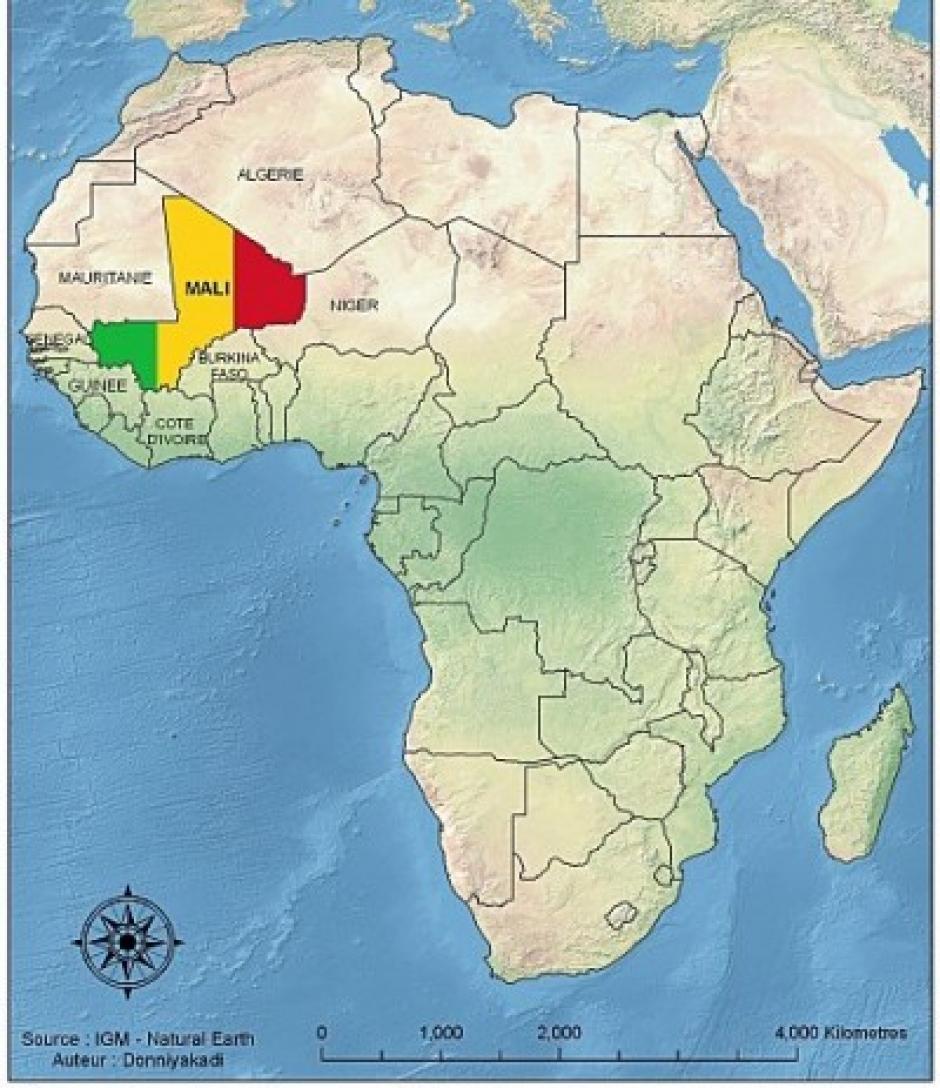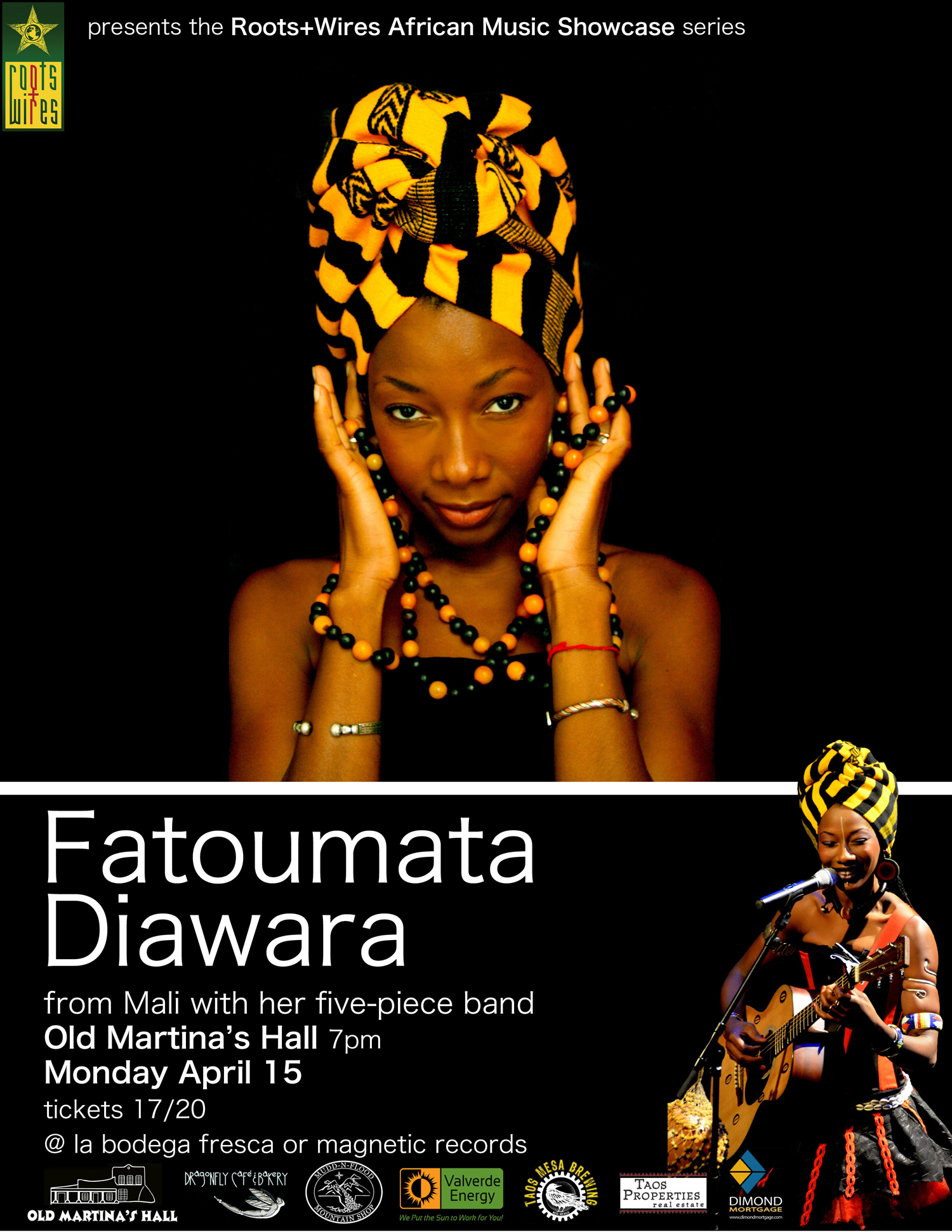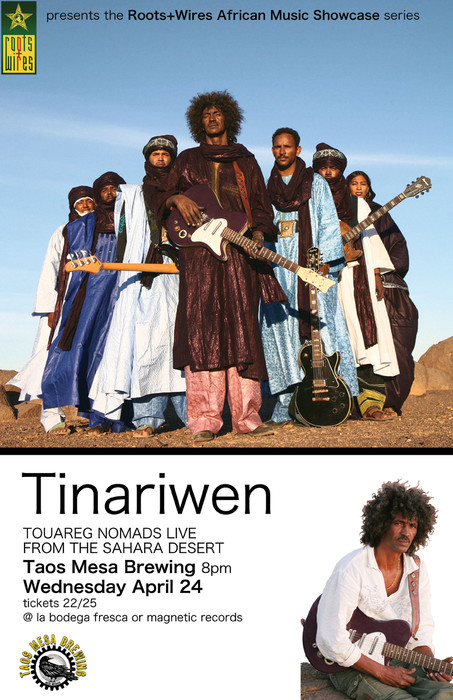Fatuomata Diawara is hot.
I’m not talking about how she looks, although there’s no denying that she is a stunningly, soberingly gorgeous human being. But there’s plenty of time to talk style later. Right now, we’re talking about her international reputation.
Born in Cote d’Ivoire to Malian parents, Fatuomata returned to Mali at 12 to live in Bamako, the capital, with her aunt and there pursue a lifelong love of dance, music, and theater. She was quite successful as a child actor, but fled to France at twenty to escape an arranged marriage and further pursue her performance career. A decade later, she has never lost her connection to her ancestral home — and now, she’s leading a major international charge to defend her cultural heritage.
But let’s back up for a second here, because if you’re going  to the show at Old Martina’s Hall on Monday (you should), and you don’t know much about Mali (Africa?), here’s your chance to do a little prep. Strap in — you might learn something.
to the show at Old Martina’s Hall on Monday (you should), and you don’t know much about Mali (Africa?), here’s your chance to do a little prep. Strap in — you might learn something.
Mali is located in West Africa — landlocked between Algeria, Niger, Mauritania, and a whole bunch of tiny coastal countries. Their most-recent colonial oppressor (and thereby major cultural influencer) was France; they achieved independence as the Mali Federation in 1960, but it wasn’t until 1991 that the independent Republic of Mali came to be.
Mali is best-known internationally for its passionate love affair with music and dance. The word most-often used to describe Malian culture seems to be “colorful,” referring not only to the bright clothing that epitomizes Malian style, but to their frequent and lengthy festivals, dances, and celebrations.
Unfortunately, Mali is also becoming increasingly well-known on the world stage thanks to recent bloody social and political upheaval. Their elected government was overthrown by soldiers in March 2012 — another flashpoint in the ongoing Arab Spring (although, in this case, the rebel soldiers overthrew what had been referred to as a “model democracy,” so, maybe not exactly moving in the direction we Westerners might hope).
The conflict has continued unabated, displacing hundreds of thousands of citizens and, despite elections approaching in July, without much hope for reconciliation any time in the near future.
And (the following turn of phrase hardly does justice to the scenario, but here goes), adding insult to injury, in January of this year, the Islamist rebels controlling two-thirds of the country banned music. Music, the beating heart and soul of Mali, is a major force in Malian culture and politics — so it’s a natural target for rebel forces. But in many ways, it was an indignity far greater than all the political upheaval of the prior year.
Enter Fatuomata Diawara. In January, she gathered over 40 Malian musicians in Bamako, and under the name Voices United for Mali, they recorded a track called Mali-ko (Peace/La Paix) — look here, a version with English subtitles! Thanks, internet! (It brought me to tears pretty quickly — trust me, it’s worth watching all 7 minutes):
Diawara particularly considers herself to be an ambassador for Malian women — the song pleads not only for peace, but for the emancipation of women (more urgent now than ever, as the Islamist rebels attempt to impose Sharia law across Mali). She’s kind of a big deal right now — search for her online and you’ll see a slew of recent articles, from all kinds of major Western news outlets.
And this burgeoning international-superstar, this lovely, colorful, sharp-as-a-tack actress-turned-musician, this very Fatuomata Diawara whom you now know so much about, is coming to Taos, thanks to our very own Roots + Wires. She comes bearing her message of peace and hope and protest — but mostly, she comes bearing soul-drenched, captivating music that I, for one, am already head-over-heels for.
Somewhat belying her powerful voice in advocacy and  activism, most of the songs on her debut album Fatou are actually quite spare and subtle. Often the songs are simply vocals, guitar, the barest hint of percussion. It’s real, sincere world music, hinting at not only Mali’s musical depths but Diawara’s own international influences. And sure, I don’t have any idea what she’s saying, but the entire album pulses with a quiet intensity that tells us she’s only just arrived, and she has quite a lot to say, and we’d do well to sit up and pay attention.
activism, most of the songs on her debut album Fatou are actually quite spare and subtle. Often the songs are simply vocals, guitar, the barest hint of percussion. It’s real, sincere world music, hinting at not only Mali’s musical depths but Diawara’s own international influences. And sure, I don’t have any idea what she’s saying, but the entire album pulses with a quiet intensity that tells us she’s only just arrived, and she has quite a lot to say, and we’d do well to sit up and pay attention.
The Diawara show, on Monday April 15 at Old Martina’s Hall, represents the second of three installments in 2013’s Roots + Wires African Music Showcase. The series opened with Oliver Mtukudzi last month, and wraps up with Diawara’s fellow-Malians Tinariwen on April 24.
I chatted with Roots + Wires duo John Henderson and Jerry Schwartz recently about all things Roots + Wires, but especially about how this particular showcase came to be.
They didn’t exactly set out to build a killer African Music Showcase this year, but rather it came together as an accident of good timing. “This is the time of year when there’s a lot of world music happening in America – Coachella, Lafayette Internationale, so on. So if you look at Tinariwen’s calendar, it’s like ‘San Francisco! Coachella! Phoenix! El Prado! Austin!’ I mean, come on, like, across from the dump!” John said, as we talked over coffee last week. “A lot of it is just who’s around and who other people are paying for, Aspen and Telluride or wherever — we just try to plug those holes. We try to scoop them up while they’re in our part of the world.”
Roots + Wires has brought Tinariwen to Taos before, of course, but they’re much bigger now — they’ve been playing stadiums this year, opening for the Red Hot Chili Peppers (yeah, apparently they still tour).
 “We worked on Tinariwen for five or six years to get them the first time, and now they’ve got a new agent,” explained John. “The other agent was much more boutique, and knew about Taos — and the new agent was definitely like, ‘Who are you? This is all you’ve got? This is a waste of my time, why are we doing this?’
“We worked on Tinariwen for five or six years to get them the first time, and now they’ve got a new agent,” explained John. “The other agent was much more boutique, and knew about Taos — and the new agent was definitely like, ‘Who are you? This is all you’ve got? This is a waste of my time, why are we doing this?’
“And then he emailed me back an hour later and said, ‘I don’t know who you are, and I don’t know where Taos, NM is, but they wanna do it.’
“We’ve had some agents say, ‘Wait – you don’t own a venue, you don’t have a liquor license, you don’t even have a PA? And nobody in this town knows these guys? And you really want to spend this money? Are you sure?’ I remember that was the first Tinariwen guy — he thought it sounded like a disaster. And I was like, no man, I know our community, it’ll be fine.”
“We’ve got a good sound guy,” added Jerry.
As for Oliver Mtukudzi, “He’s someone that a lot of people know but no one had seen,” said Jerry — and, about the show at KTAO last month: “People were ecstatic. 300 people seeing him for the first time, that was a great vibe to be a part of.”
And to top it all off, they added Fatuomata Diawara to the slate. Neither of them have ever actually seen her perform — rare for the long-time DJs and show producers, who personally vet nearly every act they bring to town — but they’ve been following her career closely, and they’re over the moon that she’s coming.
“This woman is going to be incredible – we’re all going to see her for the first time,” said Jerry. “She studied under one of Africa’s top female divas out of Mali, Oumou Sangare, and it seems like she’s taking the baton and running with it. Really, I can’t believe we’re gonna have her here.”
I asked if it makes them nervous, bringing in an artist like Diawara, who is so unknown to Taos audiences.
“I mean, if she just STANDS there I’ll be happy,” laughs John. “But seriously, we always feel really strong and clear about the artists that we bring. Last fall we took a chance and did a band called the Lee Boys — they play the slide, gospel from Florida, can we get a witness and all this – that was one where we were like, we’re just gonna roll and see what happens. And I think everybody there was sweating, I mean it was like a revival. And some people are talking about Jah, and some Jesus, and some the Devil and you know, I think that was certainly a risky one — but it was totally fine, and it was a lot of fun.”
I, for one, continue to be astounded by Roots + Wires’ ability to bring music of this caliber and international importance to Taos. To get not one but two incredibly well-known acts from Mali this year, when all eyes are on both as international ambassadors for peace to a war-torn country in the center of the Arab Spring, is a remarkable accomplishment. Plus, the Roots + Wires guys don’t just bring interesting, incomparable music here — they also consistently fill houses at venues all over town (not an unimpressive feat, here in the land of “Nah, I think I’ll just stay home tonight”), and they manage to reach a more diverse crowd than, well, probably anyone else around.
“We did a show in Seco last year with Rosie Ledet, this woman who plays Zydeco,” John said. “And we had a couple other bands, it was Memorial Day, and at 7:30 at night I’m looking around — there’s white people, there’s Hispanic people, there’s Native people, there’s young people, there’s old people, there’s hippies… really, bringing everybody together through music.”
“So yeah, there’s all the deep cultural ramifications with the artists that we bring,” added Jerry, “But when it comes down to it, it’s all about bringing people together.”
I’m certain they’ll bring yet another fantastic audience together on to see Fatuomata Diawara and her 5-piece band on Monday night at Old Martina’s Hall — we’ll see you there!

